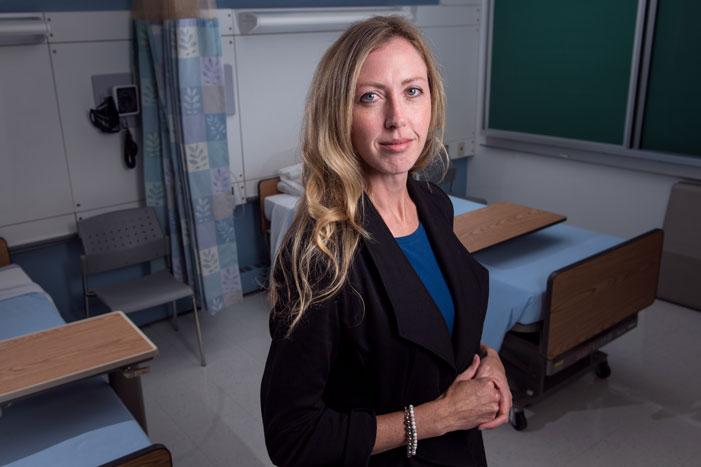UNB researchers part of 3 million project addressing domestic violence
Author: UNB Newsroom
Posted on Oct 20, 2017
Category: UNB Fredericton

Backed by more than $3 million in federal funding, researchers with the nursing faculty at the University of New Brunswick have joined colleagues at universities in Canada and the U.S. in studying a new approach to helping women who experience domestic violence.
Co-led by UNB’s Dr. Kelly Scott-Storey, the researchers are tasked with examining the effectiveness of iHEAL, an emerging model of care for those who have suffered domestic abuse.
With iHEAL, working in partnership with community partners, community health nurses work one-on-one with women to guide recovery, helping them not only access appropriate services but ensure that there is a strong focus on personal health and healing.
“iHEAL is about focusing on the woman, and helping her to gain strength and knowledge, and to improve health in order to heal and move forward in her life,” says Dr. Scott-Storey, associate professor of nursing at UNB. “Many of the existing services focus on safety, on legal aspects, on custody of children and so forth. But there is never really a comprehensive focus on a woman’s overall health. We know that in order for women to effectively navigate recovery from abuse, they need to be healthy – physically and mentally.”
Dr. Scott-Storey is working with project co-leads Dr. Marilyn Ford-Gilboe of the University of Western Ontario and Dr. Colleen Varcoe at the University of British Columbia as well as colleagues from UNB, McMaster University, the Université de Montréal, and Johns Hopkins University on the research, funded by the Public Health Agency of Canada.
UNB is receiving about $1 million, or one-third of the funding for the project.
“I salute Dr. Scott-Storey for her leadership role in this important national research on improving how Canada responds to victims of domestic violence,” says Dr. David MaGee, acting vice-president of research at the University of New Brunswick. “Given UNB’s pioneering work in domestic violence research and its impact on victims and communities, it is gratifying to see that she will be co-leading this study.”
Dr. Patricia Seaman, acting dean of nursing at UNB, applauds the Public Health Agency of Canada for funding such important research and praises Dr. Scott-Storey’s skills as a “next-generation researcher.”
“We wouldn’t be able to make this kind of progress without the support of the Public Health Agency of Canada,” Dr. Seaman says. “It is immensely gratifying to see Kelly and her colleagues recognized for all of their hard work and innovation in designing better ways of healing and helping – innovation that promises to have a profound effect on people and society.”
The five-year project will deliver iHEAL sessions to women from both rural and urban communities in New Brunswick, Ontario and British Columbia and evaluate the intervention’s effectiveness.
“One of the goals behind iHEAL is to help women develop a capacity to address the intrusiveness of violence in their life,” says Dr. Scott-Storey. “Violence doesn’t just end because women have separated from the partner. There is ongoing violence, there is social isolation. There are distressing health problems, and there is the cost of getting help and services. iHEAL is intended to help women set their own priorities, address safety, health and healing, while connecting to them to resources within their community.”
Early evaluations suggest the intervention is effective, Dr. Scott-Storey says. Women have described iHEAL as “a lifeline” and “life changing.”
“Women have told us that it has helped them be stronger, more capable, determined, knowledgeable and better connected to existing services,” she says. “And I know from a health perspective, women’s mental health has certainly improved. The number of women with clinical symptoms of Post-Traumatic Stress Disorder and depression have declined after going through iHEAL. ”
“We are excited about the promise of the iHEAL intervention and the opportunities to connect with community partners in delivering it; we know that women’s health can be improved with better partnerships between health service providers and domestic violence services.”
Media contact: David Stonehouse
Photo: Dr. Kelly Scott-Storey, associate professor of nursing at UNB, is one of the lead researchers on a $3 million study into domestic violence. Photo credit: Rob Blanchard / Photo UNB.
